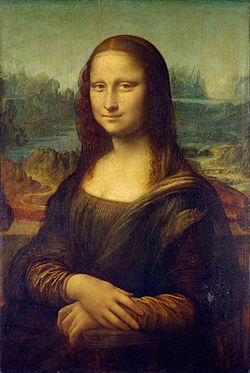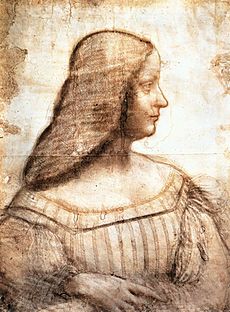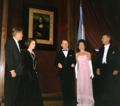Mona Lisa facts for kids
Quick facts for kids Mona Lisa |
|
|---|---|
| Italian: La Gioconda, French: La Joconde | |
 |
|
| Artist | Leonardo da Vinci |
| Year | c. 1503–1519 |
| Type | Oil on poplar |
| Location | Musée du Louvre, Paris |
Mona Lisa (also known as La Gioconda or La Joconde) is a 16th-century portrait painted in oil by Leonardo da Vinci during the Renaissance in Florence, Italy. Many people think Mona Lisa's smile is mysterious. It is so often studied, recognized, and copied that it is the most famous painting in the world. The Louvre says that about 80 percent of its visitors come to see the painting of Mona Lisa.
Leonardo began painting the Mona Lisa in 1503 or 1504 in Florence, Italy. According to Da Vinci's biographer (a person who writes about the life of another person), Giorgio Vasari, "...after he had lingered over it four years, left it unfinished....". The painting was brought to France by Leonardo in 1516, and it was bought by Francis I of France.
The Mona Lisa is now owned by the Government of France and is shown at the Musée du Louvre in Paris under the title Portrait of Lisa Gherardini, wife of Francesco del Giocondo. For many years, there were other ideas of who the woman in the painting may be. In 2005, Dr. Armin Schlechter found notes that prove that the portrait is Lisa, the wife of Francesco del Giocondo, a rich silk merchant, who lived in Florence. This is the idea that most people accepted since it had already been written by Giorgio Vasari.
Stolen
On August 21, 1911, the Mona Lisa was stolen. The Louvre museum thought it was being photographed, but when they checked, it was not there. The Louvre closed for one week to help look for it.
People thought Guillaume Apollinaire, a French poet, stole it. He was put into jail and tried to make people think his friend Pablo Picasso stole it. It was not either of them, though.
The painting was lost for two years, and everybody thought it would be lost forever. A worker at the Louvre named Vincenzo Peruggia had actually stolen it. He had hidden it in his coat and walked out with it after the museum had closed. He wanted the painting to go back to Italy and to be shown in an Italian museum. After hiding it in his apartment for two years, he grew impatient and tried to sell it to a gallery in Florence, but was caught. It was shown all over Italy before going back to the Louvre. People thought Vincenzo was a hero who loved Italy, so he only spent a few months in jail.
Interesting Facts about the Mona Lisa
- Leonardo Da Vinci’s right hand was partially paralyzed by 1517, so the painting may not have its finishing touches.
- The Mona Lisa has been displayed in the palaces of King Francis I, King Louis XIV, and Napoleon Bonaparte.
- Some other suggestions of who the woman in the painting may be are Constanza d’Avalos, Beatrice d’Este, or Isabella of Aragon.
- Lisa's husband, Francesco del Giocondo, commissioned Da Vinci to complete the painting of his wife to celebrate their new home and the birth of their second son.
- The painting was not painted on canvas. It was painted on a poplar plank (a flat piece of wood).
- The Mona Lisa is only 30 in. x 21 in (77 cm x 53 cm), but is quite heavy for its size: 18 lbs (8.16 kg).
- French law states that the Mona Lisa cannot be bought or sold.
- The painting was moved several times during World War II to keep the Nazis from stealing it.
- Many people have tried to damage the Mona Lisa. It is now hanging behind bullet-proof glass.
Images for kids
-
A margin note by Agostino Vespucci (visible at right) discovered in a book at Heidelberg University. Dated 1503, it states that Leonardo was working on a portrait of Lisa del Giocondo.
-
Colour portraits of Isabella d'Este in the Kunsthistorisches Museum, Vienna (perhaps including mix-up)
-
Louis Béroud's 1911 painting depicting Mona Lisa displayed in the Louvre before the theft, which Béroud discovered and reported to the guards
-
Mona Lisa behind bulletproof glass at the Louvre Museum
-
U.S. President John F. Kennedy, Madeleine Malraux, André Malraux, Jacqueline Kennedy, and Lyndon B. Johnson at the unveiling of the Mona Lisa at the National Gallery of Art during its visit to Washington D.C., January 8, 1963
-
Raphael's Young Woman with Unicorn, c. 1506
-
Marguerite Agniel "As Mona Lisa" by Robert Henri, c. 1929
See also
 In Spanish: La Gioconda para niños
In Spanish: La Gioconda para niños




















